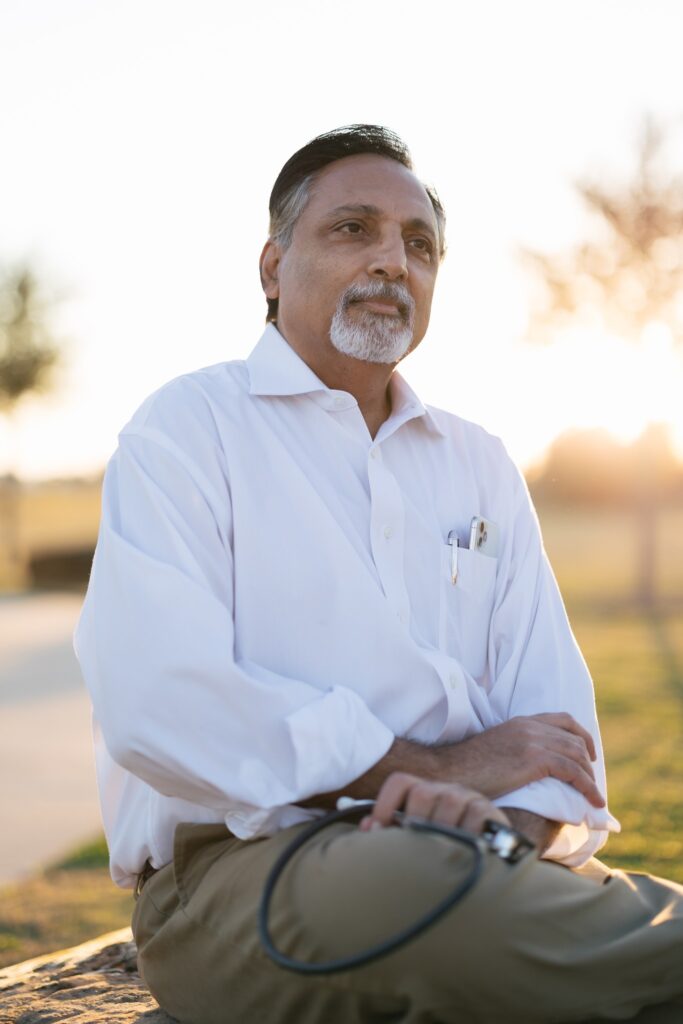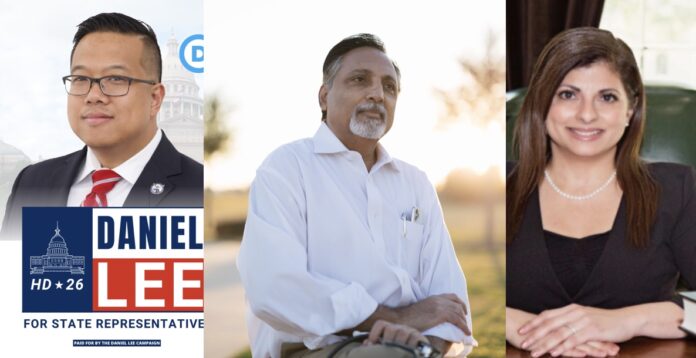By Julia Tong, AsAmNews Staff Writer
As the November 2022 midterm elections approach, communities of color across the nation are fighting for representation in their state governments. Among them are three Asian American candidates who are running for seats in the greater Houston metropolitan area.
In an Ethnic Media Services briefing cosponsored by EMGAGE, OCA -Greater Houston, and Bridges to Empowerment, these candidates shared the stories and motivations behind their campaigns. They plan to tackle urgent issues such as government accessibility, healthcare, gun control, and education that are critical to the communities they serve.
“Representation is of utmost importance”
As the son of Chinese and Filipino immigrants, Daniel Lee saw firsthand the difficulties his parents faced as restaurant owners in the 1970s and 80s. Language and cultural barriers made it difficult for them to navigate the U.S.’s complex, unfamiliar legal system. Tackling this issue, he said, motivated him to go to law school and become an attorney.
“The main reason that I became an attorney, and I’ve been an attorney for 15 years, is because of that same situation,” Lee says. “With the small businesses came a lot of legal issues that they as immigrants were not equipped to handle due to their lack of understanding of the culture and the laws here and the language.”
Now, Lee is adding a new chapter to his career: running as a Democratic State Representative candidate in House District 26, located in Fort Bend County. He hopes that doing so will allow him to proactively pass laws, finding solutions to the daily issues Texans face.
During his time as a lawyer, Lee was approached by thousands of clients who asked him to help fix specific issues. However, he had to inform them to contact their elected officials to change the laws. He says that the current Republican-dominated legislature’s refusal to hear special sessions has made securing needed legislative changes even harder.
“After 15 years of telling [clients] that, I said no. No more. We got to make changes now. We’re not waiting until the next legislative session,” says Lee.
“Those important issues are impacting us negatively right now, not 2023.”
As a State Representative, Lee wants the issues facing ordinary Texans—for instance, crime, the economy, and healthcare—to be prioritized at the highest levels of government. Among these are common sense gun laws and universal background checks; funding to ensure schools retain quality teachers and administrators; and expanded Medicaid and Medicare access for all citizens.
Aside from these issues, Lee is passionate about the importance of representation. As a lawyer, he frequently serves members of the AAPI community. He hopes to be a positive role model for his constituents.
“Representation is of utmost importance,” he says, adding: “I believe it’s very important because the future of our children and our grandchildren… they need someone to look up to. But not only that, we need people that essentially are good examples, and have good plans.”
“I want to bring the human aspect of our healthcare system failure to legislation”

In 1990, impressed by the US’s advanced medical innovations, Suleman Lulani immigrated to the US to become a doctor. When he studied at Baylor, however, he was shocked by the inequalities of the American healthcare system.
“We have the world’s largest medical center… Yet we have we are number one in the highest number of uninsured,” Lalani says. “We all know who’s who the world can fly in to get the treatment here, but our own people cannot cross the street to access that.”
Today, Lalani is a board-certified doctor with 17 years of experience serving the greater Houston area. Now, as a Democratic candidate for Texas’s House District 76, he is determined to use his medical background to advocate for needed changes to healthcare, safety, and education in the state.
“That’s what I want to bring: the human aspect of our healthcare system failure to legislation,” Lalani says.
Lalani is an advocate for Medicare and Medicaid expansions. Beyond that, he says that investments in more proactive healthcare is necessary. 5% of Medicare beneficiary dollars are spent in the last year of life: As an example, someone who can’t afford $200 in medication could end up in the ER with a $200,000 bill and compromised quality of life.
Beyond health coverage, Lalani’s medical background informs his stances on other pressing issues. Lalani supports increased public school funding, which will help attract and retain teachers, building a stronger school system.
Furthermore, Lalani recalls seeing patients ending up in the ER due to gun trauma every day. As a result, he is a strong advocate for common sense gun laws, such as universal background checks, red flag laws, and gun safety training. Another approach he proposes is revoking gun licenses: as a doctor, he says, he can order a patient’s driver’s license to be taken away if they posed a threat to others on the road.
“If I am able to do that for the betterment of the society, why can’t a cop do that if they feel that somebody is not competent, or doesn’t have the right frame of mind, or is a threat to himself or others?” he asks.
For Lalani, balancing the needs of his patients and the requirements of a political position will be difficult. However, he is eager to rise to the challenge, and actively tackle the challenges facing his community.
“We need to get out of sofa politics and get out to participate,” he says. “We need to be the change that we want to be.”
“It’s time for us to be represented”
South Asian lawyer and longtime Fort Bend resident Sonia Rash is deeply involved in her community. She has volunteered for numerous grassroots organizations and offered free legal clinics to those in need. Her experience taught her the importance of having representatives that fully understand the communities they serve—something that, she says, Fort Bend is missing in government.
“We have a lot of South Asians, we have a lot of minority communities here that haven’t really been represented,” Rash says. “And I think that it’s time for us to be represented.”
To close that gap, Rash is running for Justice of the Peace in Texas’s District 3. The Justice of the Peace presides over cases including traffic tickets, truancy, small claims, and evictions. For Rash, the position will allow her to continue serving the communities she belongs to.
“It’s not just about being a Justice of the Peace judge and sitting on a bench for me,” Rash says. “It’s about…using that platform to help all of the communities, whether it’s just by having community outreach programs or creating programs that are going to help everybody within our community and within our precinct.”
As Justice of the Peace, Rash plans to make the court more accessible to her constituents. Among these changes are instituting video conference hearings and night court sessions to better accommodate working people’s schedules. She also hopes to hold community outreach seminars to educate the public on the court’s functions, such as landlord and tenant rights, truancy, and small claims.
However, running for office as a South Asian candidate has been challenging. Recently, for instance, the yard signs of her and other minority candidates were disfigured with crosses. Lalani has faced similar rhetoric from a Republican opponent disparaging his religion.
But Rash isn’t intimidated by these obstacles.
“It doesn’t scare me. What it does is actually bring me to the challenge that we can’t have a community be like this,” she says. “We are all in the same community. We live in the United States, one of the greatest countries in the whole world, and we have to unite.”
AsAmNews is published by the non-profit, Asian American Media Inc.
We’re now on BlueSky. You can now keep up with the latest AAPI news there and on Instagram, TikTok, Facebook, YouTube and X.
We are supported by generous donations from our readers and by such charitable foundations as the Robert Wood Johnson Foundation.
You can make your tax-deductible donations here via credit card, debit card, Apple Pay, Google Pay, PayPal and Venmo. Stock donations and donations via DAFs are also welcomed.



Health care is not the business of government. The CIC (Coprolite in Chief) who now occupies the oval office is living proof that it’s a very bad idea. Except for military defense, interstate trade and transportation, etc., the government has created unsurvivable swamps. Evidence is the Mexican border where five million patients have stampeded through and soon will bankrupt what’s left of our medical care facilities.